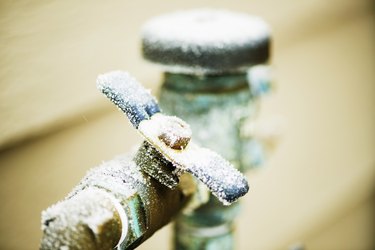Essential Strategies for Avoiding Frozen Pipes in Cold Weather
Essential Strategies for Avoiding Frozen Pipes in Cold Weather
Blog Article
This article down below pertaining to How to Prevent Your Pipes From Freezing is really enlightening. You should take a look.
:strip_icc()/snow-outdoor-faucet-pipes-4af65d1e5e904fb1aa7bf74071fe5d89.jpg)
Winter can ruin your pipes, specifically by freezing pipes. Below's just how to stop it from taking place and what to do if it does.
Intro
As temperature levels decrease, the danger of frozen pipelines rises, potentially leading to costly repair services and water damages. Understanding exactly how to stop icy pipelines is crucial for property owners in chilly environments.
Avoidance Tips
Shielding prone pipes
Cover pipelines in insulation sleeves or use heat tape to protect them from freezing temperature levels. Focus on pipelines in unheated or outside locations of the home.
Home heating methods
Maintain interior areas sufficiently heated, particularly locations with pipes. Open up cabinet doors to enable cozy air to flow around pipes under sinks.
Just how to recognize frozen pipelines
Seek decreased water flow from faucets, unusual odors or noises from pipelines, and noticeable frost on subjected pipelines.
Long-Term Solutions
Architectural changes
Take into consideration rerouting pipelines far from exterior walls or unheated areas. Add extra insulation to attic rooms, cellars, and crawl spaces.
Updating insulation
Purchase premium insulation for pipes, attics, and wall surfaces. Appropriate insulation assists maintain regular temperature levels and decreases the risk of icy pipelines.
Shielding Exterior Pipes
Garden pipes and outdoor faucets
Detach and drain yard tubes before wintertime. Mount frost-proof spigots or cover outdoor taps with shielded caps.
Recognizing Frozen Pipelines
What triggers pipes to freeze?
Pipelines freeze when subjected to temperature levels below 32 ° F (0 ° C) for prolonged durations. As water inside the pipelines ices up, it expands, putting pressure on the pipe wall surfaces and possibly creating them to burst.
Risks and damages
Frozen pipes can result in water disturbances, residential property damages, and pricey repair services. Ruptured pipes can flood homes and cause extensive structural damages.
Indicators of Frozen Water Lines
Determining icy pipelines early can stop them from breaking.
What to Do If Your Pipelines Freeze
Immediate actions to take
If you think frozen pipelines, maintain faucets available to ease pressure as the ice thaws. Utilize a hairdryer or towels soaked in warm water to thaw pipes gradually.
Conclusion
Preventing frozen pipelines requires aggressive steps and fast responses. By comprehending the causes, signs, and preventive measures, homeowners can safeguard their pipes during winter.
Helpful Tips to Prevent Frozen Pipes this Winter
UNDERSTANDING THE BASICS: WHY PIPES FREEZE AND WHY IT’S A PROBLEM
Water freezing inside pipes is common during the winter months, but understanding why pipes freeze, and the potential problems it can cause is crucial in preventing such incidents. This section will delve into the basics of why pipes freeze and the associated problems that may arise.
THE SCIENCE BEHIND FROZEN PIPES
When water reaches freezing temperatures, it undergoes a physical transformation and solidifies into ice. This expansion of water as it freezes is the primary reason pipes can burst. As the water inside the pipe freezes, it expands, creating immense pressure on the walls. If the pressure becomes too great, the pipe can crack or rupture, leading to leaks and water damage.
FACTORS THAT CONTRIBUTE TO PIPE FREEZING
Low Temperatures: Extremely cold weather, especially below freezing, increases the risk of pipes freezing. Uninsulated or Poorly Insulated Pipes: Pipes located in unheated areas, such as basements, crawl spaces, or attics, are more prone to freezing. Insufficient insulation or lack of insulation altogether exacerbates the problem. Exterior Wall Exposure: Pipes running along exterior walls are susceptible to freezing as they encounter colder temperatures outside. Lack of Heating or Temperature Regulation: Inadequate heating or inconsistent temperature control in your home can contribute to frozen pipes. PROBLEMS CAUSED BY FROZEN PIPES
- Pipe Bursting: As mentioned earlier, the expansion of water as it freezes can cause pipes to burst, resulting in significant water damage.
- Water Damage: When pipes burst, it can lead to flooding and water damage to your property, including walls, ceilings, flooring, and personal belongings.
- Structural Damage: Prolonged exposure to water from burst pipes can compromise the structural integrity of your home, leading to costly repairs.
- Mold and Mildew Growth: Excess moisture from water damage can create a favorable environment for mold and mildew growth, posing health risks to occupants.
- Disrupted Water Supply: Frozen pipes can also result in a complete or partial loss of water supply until the issue is resolved.
WHY CERTAIN PIPES ARE MORE PRONE TO FREEZING
- Location: Pipes located in unheated or poorly insulated areas, such as basements, crawl spaces, attics, or exterior walls, are at higher risk of freezing.
- Exterior Pipes: Outdoor pipes, such as those used for irrigation or exposed plumbing, are particularly vulnerable to freezing as they are directly exposed to the elements.
- Supply Lines: Pipes that carry water from the main water supply into your home, including the main water line, are critical to protect as freezing in these lines can affect your entire plumbing system.
- Underground Pipes: Pipes buried underground, such as those connected to sprinkler systems or outdoor faucets, can be susceptible to freezing if not properly insulated.
https://busybusy.com/blog/helpful-tips-to-prevent-frozen-pipes-this-winter/

We were made aware of that article about Prevent Frozen Pipes through an associate on a different web address. If you appreciated our post if you please don't forget to share it. Thanks a lot for going through it.
Set An Appointment Report this page